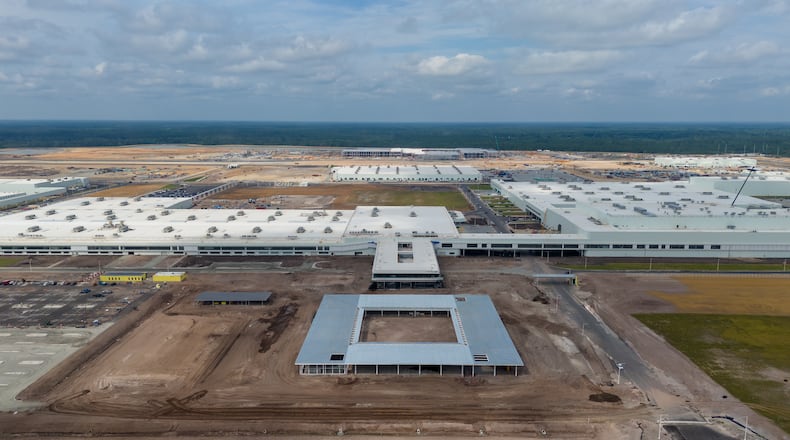Editor’s note: This story has been updated to clarify the public comment timeline for Hyundai’s air pollution permit application.
Electric vehicles may not be the only cars coming off assembly lines at Hyundai Motor Group’s sprawling factory near Savannah.
The Korean automaker recently asked state environmental regulators to amend permits to allow for gasoline storage and fuel filling equipment at the 3,000-acre factory site in Bryan County, documents obtained by The Atlanta Journal-Constitution show.
The records obtained by the AJC are the first known formal steps by Hyundai to potentially include hybrid vehicle manufacturing at the site along I-16. José Muñoz, Hyundai Motor Group’s North American chief executive, told media outlets in March that the automaker was considering adding hybrid production to what Hyundai calls the Metaplant in response to market trends.
The Georgia Environmental Protection Division previously approved air pollution permits for the $7.6 billion factory, which is set to employ 8,500 workers, but those permits have to be amended to allow gasoline on site because of its hazardous and combustible vapors.
If approved, it would open the door for Hyundai to build hybrid cars alongside EVs at the 15 million-square-foot factory, a sign the company seeks to diversify its manufacturing offerings there in response to concerns about consumer appetite for fully plug-in vehicles.
“(Hyundai Motor Group Metaplant America) is seeking an amendment to its air permit to allow for the operation of gasoline tanks and filling equipment for the potential assembly of hybrid electric vehicles,” a company spokesperson told the AJC. “Hyundai Motor Group is always evaluating various options to adapt to market and consumer demand.”
EV sales grew nearly 12% year-over-year in the second quarter of 2024, according to estimates from Cox Automotive, with a record 330,000 units sold. Still, consumers have not embraced EVs as quickly as some automakers had expected, as concerns linger about the vehicles’ range, charging away from home and higher initial cost compared to internal combustion-powered cars.
To bridge the gap to fully electric ownership, some carmakers are expanding their offerings of hybrid and plug-in hybrid cars, which feature battery propulsion for short distances and a gas-powered engine for extended range. Hybrid sales are growing at a faster pace than full EV or conventional vehicles.
The U.S. Environmental Protection Agency, meanwhile, recently revised emission rules that are not as strict as previous draft rules. The new rules will give automakers some flexibility with regard to electrification and also favor plug-in hybrids rather than just incentivizing fully electric cars.
Hyundai filed its request to amend its air rights permits on May 21, seeking to add two 9,900-gallon gasoline storage tanks and gasoline filling equipment to the Metaplant site. The factory’s assembly shop plans to add exhaust stacks to vent vehicle engine exhaust from testing and vehicle startups.
Liquid gasoline emits volatile organic compounds (VOCs), which require testing and approval from regulators like the Georgia EPD. Draft permits obtained by the AJC show Hyundai plans to maintain the Metaplant’s previously approved VOC limit and that the gasoline storage and equipment will “not increase any VOC emissions.”
The EPD will take public comments on the application until Aug. 9, and a department spokesperson said Aug. 7 that no comments had been received at that time. The draft permits showed EPD officials recommended approving Hyundai’s request. Georgia EPD did not immediately provide an estimate for when final permits could be approved.
Credit: Courtesy Hyundai Motor Group Metaplant America
Credit: Courtesy Hyundai Motor Group Metaplant America
The Metaplant is expected to have an annual manufacturing capacity of 300,000 vehicles and is likely to open during this year’s fourth quarter. To woo the company to Bryan County, state and local officials offered Hyundai a $1.8 billion incentive package, the largest in Georgia history.
This is not the first time Hyundai has considered building vehicles with internal combustion engines or hybrid powertrains at the Metaplant, which will produce Hyundai, Kia and Genesis models. Prior to announcing the factory in 2022, Hyundai officials considered vehicles with other drivetrains being built there.
Muñoz has said Hyundai, which is the second-largest seller of EVs behind Tesla, is not strategically shifting gears away from fully electric cars. But he told CNBC at the New York International Auto Show in March that “everything is on the table” as the company reacts to market forces that are controlling the long-term future of the automobile industry.
“We’ve been one of the pioneers on (EVs) and I think we want to take advantage of that,” he said. “But hybrid is very important … our hybrid production is growing. There’s a high demand for it. So you’re going to see an increase in the mix of hybrids in Hyundai as well.”
Cox Enterprises, the owner of the AJC, also owns Cox Automotive.
Keep Reading
The Latest
Featured






